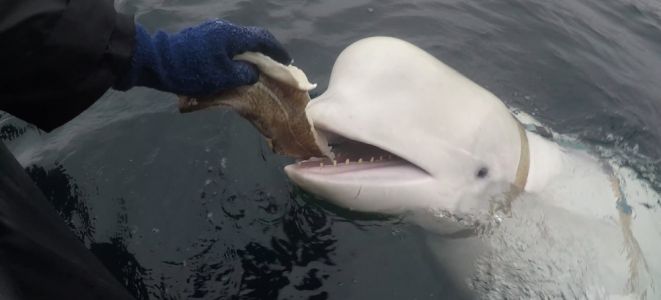 Hvaldimir, the beluga “spy” whale has died. The Norwegian public broadcaster NRK reported that the whale’s body was found floating in the Risavika Bay in southern Norway on Saturday by a father and son who were fishing.
Hvaldimir, the beluga “spy” whale has died. The Norwegian public broadcaster NRK reported that the whale’s body was found floating in the Risavika Bay in southern Norway on Saturday by a father and son who were fishing.
The beluga, whose nickname was a combination of the Norwegian word for whale – hval – and the first name of the Russian president, Vladimir Putin, was lifted out of the water by crane and taken to a nearby harbor, where experts will examine it.
In the Spring of 2019, fishermen off the coast of Norway near Hammerfest, encountered a beluga whale wearing a harness inscribed with the label “Equipment of St. Petersburg.” After being freed from the harness, the whale remained in the area and appeared to enjoy interacting with humans. Researchers think the beluga may have been a Russian spy in training.
There was speculation that the harness-wearing beluga was part of Russian spycraft gone wrong. The harness was believed to be designed for some sort of camera or possibly a weapon.
Subsequently, the whale “defected” to Norway, apparently preferring to stay in Norwegian waters than return to Russia. For some time, the whale interacted with boaters around Hammerfest Harbor in Norway, before swimming off to feed along the Norwegian coast.
In 2023, Hvaldimir reappeared in Oslofjord and the Norwegian Directorate of Fisheries warned people to keep away from the ‘spy’ whale for the animal’s safety. The directorate noted that “it has arrived in a very densely populated area, and the risk that the whale may be injured due to human contact has become significantly greater.”
Last year, Hvaldimir was seen off the coast of Sweden, a journey that took him farther away from food sources and on a path toward more industrial and dangerous harbors. Within several months, he once again returned to Norwegian waters.
As noted by the New York Times, if Hvaldimir was a spy, he was an exceptionally friendly one.
From the start, the whale showed signs of domestication and was comfortable around people. He remained in busier waters than are typical for belugas, prompting concerns from scientists, activists, and experts.
“He was completely acclimatized to human culture,” Sebastian Strand, founder of the nonprofit, Marine Mind, said, adding that it appeared Hvaldimir had “been in captivity for a lot of his life.”
Mr. Strand said that he had been promoting safety measures for Hvaldimir, who had so far enjoyed a calm year, and had seemed to be in good health on Friday based on reports.
“I’m not sure what’s happened,” Mr. Strand said. “But we’ll find out.”
